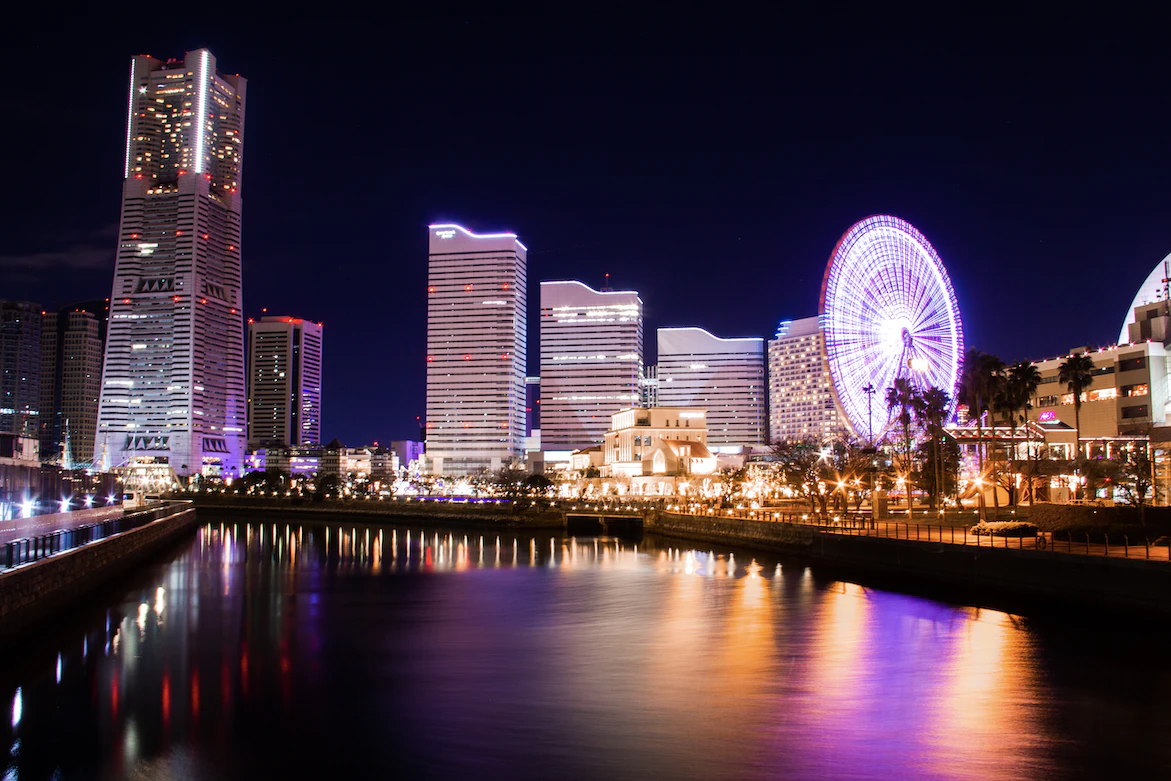Ultimate Kanagawa Travel Guide: Best Things to Do & See Near Tokyo
Kanagawa Prefecture, just south of Tokyo, is a treasure trove of experiences for every traveler. From the futuristic skyline of Yokohama to the tranquil hot springs of Hakone and the historic temples of Kamakura, Kanagawa offers a perfect blend of modern excitement, cultural heritage, and natural beauty. Whether you’re planning a day trip from Tokyo or a longer stay, this guide covers the must-see spots and insider tips to make the most of your visit.
Minato Mirai (Yokohama)
Why Visit: Minato Mirai is Yokohama’s iconic waterfront district, famous for its stunning skyline, shopping, and entertainment.
Highlights:
- Landmark Tower: One of Japan’s tallest buildings with a panoramic observation deck.
- Cosmo World: Amusement park featuring the Cosmo Clock 21 Ferris wheel, offering breathtaking night views.
- Yokohama Museum of Art: Modern and contemporary art exhibitions.
- Red Brick Warehouse: Historic buildings now home to trendy shops and restaurants.
Travel Tips:
- Best visited in the evening for illuminated city views.
- Easy access from Yokohama Station (10-15 min walk).
Yokohama Chinatown
Why Visit: The largest Chinatown in Japan, bursting with color, culture, and culinary delights.
Highlights:
- Vibrant Chinese gates and lantern-lit streets.
- Hundreds of authentic Chinese restaurants—try steamed buns, dim sum, and spicy Sichuan dishes.
- Regular festivals and cultural events.
Travel Tips:
- Visit during Chinese New Year for lively celebrations.
- Most shops accept credit cards, but some food stalls are cash-only.
Enoshima
Why Visit: A scenic island getaway with ocean views, shrines, and fresh seafood, just an hour from Tokyo.
Highlights:
- Enoshima Sea Candle: Lighthouse with panoramic views of Mt. Fuji and the Shonan coast.
- Enoshima Shrine: Picturesque Shinto shrine complex.
- Iwaya Caves: Explore mysterious sea caves.
- Local seafood restaurants.
Travel Tips:
- Wear comfortable shoes for walking and stairs.
- Combine with a visit to nearby Kamakura for a full day trip.
Kamakura & The Great Buddha (Daibutsu)
Why Visit: Kamakura is a historic city known for its temples, shrines, and the iconic Great Buddha statue.
Highlights:
- The Great Buddha (Kamakura Daibutsu): 11.4m tall bronze statue, open for visitors to enter inside.
- Hasedera Temple: Famous for hydrangeas and sea views.
- Komachi Street: Lively shopping street with local snacks and souvenirs.
Travel Tips:
- Kamakura is best explored on foot or by rental bicycle.
- Visit early morning or late afternoon to avoid crowds.
Tsurugaoka Hachimangu Shrine
Why Visit: Kamakura’s most important Shinto shrine, rich in history and seasonal beauty.
Highlights:
- Majestic torii gates and long approach lined with cherry trees.
- Seasonal festivals and traditional weddings.
- Views of Kamakura from the main hall.
Travel Tips:
- Autumn is especially beautiful with colorful foliage.
- Combine with a stroll through Kamakura’s old town.
Hakone (Hot Springs & Nature)
Why Visit: Hakone is a renowned hot spring resort area surrounded by mountains, lakes, and art museums.
Highlights:
- Relax in an onsen (hot spring bath) with views of Mt. Fuji.
- Hakone Open-Air Museum: Outdoor sculptures and art installations.
- Lake Ashi: Scenic cruises with views of Mt. Fuji and the Hakone Shrine.
- Hakone Ropeway: Panoramic views of volcanic landscapes.
Travel Tips:
- Hakone Freepass offers unlimited rides on local transport.
- Many ryokan (traditional inns) offer day-use hot springs.
Miura Peninsula
Why Visit: A less-crowded coastal area with beautiful beaches, fishing villages, and fresh seafood.
Highlights:
- Jogashima Island: Dramatic cliffs and hiking trails.
- Surfing and swimming beaches.
- Local seafood markets and restaurants.
Travel Tips:
- Ideal for a relaxing day trip from Tokyo or Yokohama.
- Rent a bicycle to explore the coastline.
Getting to Kanagawa
- From Tokyo: Most destinations in Kanagawa are accessible by train (JR, Odakyu, or Keikyu lines) within 30-90 minutes.
- IC Cards: Use Suica or Pasmo for convenient travel on trains and buses.
When to Visit
- Spring (March–May): Cherry blossoms in Kamakura and Yokohama.
- Autumn (October–November): Colorful foliage in Hakone and shrines.
- Summer: Beach season on the Miura Peninsula.
- Winter: Clear views of Mt. Fuji from Enoshima and Hakone.
Essential Tips
- Many attractions are cash-friendly, but major stations and restaurants accept credit cards.
- English signage is common in tourist areas, but a translation app can be helpful.
- Consider staying overnight in Hakone or Kamakura for a more relaxed experience.
